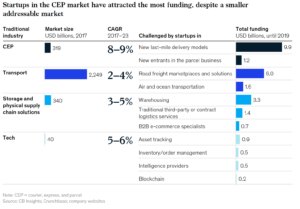Venture capitalists have recently invested around $28 billion in logistics startups, nearly all of it since 2015. As new technologies have entered the transport and logistics sector, efficiency has increased and prices have decreased. Yet the industry continues to face significant challenges, including a high number of breakpoints, complex pricing rules, and a lack of data standardization.
While low profitability has made it difficult for the industry to address these issues, a new generation of logistics startups aims to solve them. In a new McKinsey report ‘Startup funding in logistics: New money for an old industry?‘ they analyze more than 120 of logistics startups representing an estimated 93 percent, or $26 billion, of total startup funding in logistics to date. McKinsey explores recent funding trends and their implications for incumbents, startups, and investors. The findings show that growth is no longer fueled by having multiple funding rounds; instead, it occurs as startups reach maturity and receive larger funding rounds.
Last mile: Venture capital’s favorite
Most funding (around $11.1 billion) was raised by startups offering last-mile delivery services to retailers and individuals. Of this amount, $9.9 billion went to startups that focus on unconventional delivery modes, such as crowdsourced delivery, drones, autonomous vehicles, and shipments to parcel lockers. This suggests that investors see an opportunity for unconventional last-mile services to complement companies with traditional delivery fleets as they anticipate the next normal in last-mile parcel deliveries.
Six of the top ten best-funded logistics startups are from China. China’s dominance is driven by a tendency to innovate fast and a willingness to try out novel business models, accelerated by stronger overall economic growth. McKinsey: “The money raised by their Asian and US peers has reached levels that European startups can only dream of. Europe’s logistics startups are funded far less and only account for a 5 percent share of the cumulative logistics startup funding”.
Disruption? Maybe not…
Although logistics incumbents are not going anywhere, the question remains: How disruptive will these startups turn out to be? The good news for the traditional logistics providers is that the network, assets, and relationships of incumbents are not going to be disrupted over the short term, at least not in their major markets. Startups are eating away at incumbents’ growth prospects. Despite the fact that incumbents are here to stay, startups have managed to tap into markets that incumbents have long ignored.
Source: McKinsey

